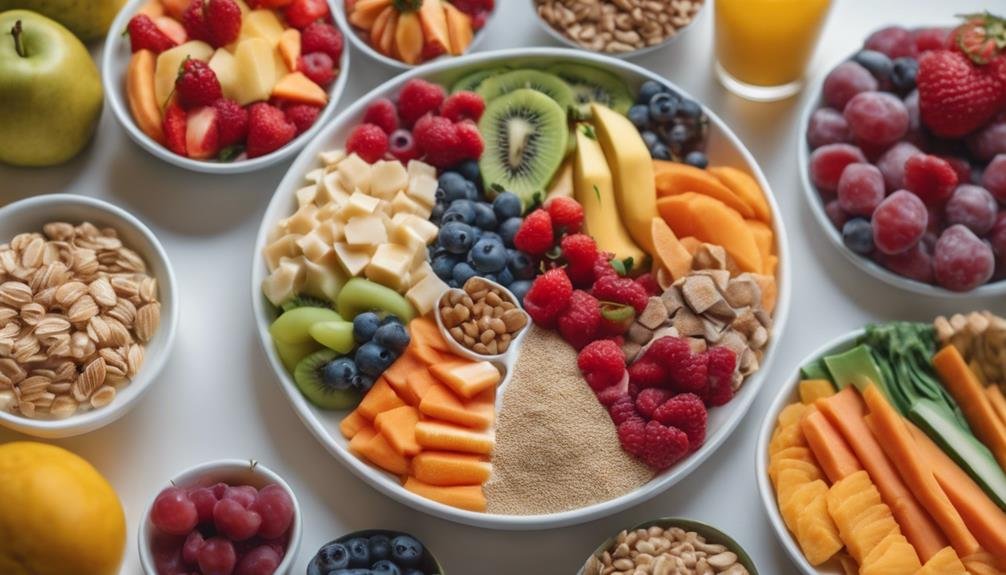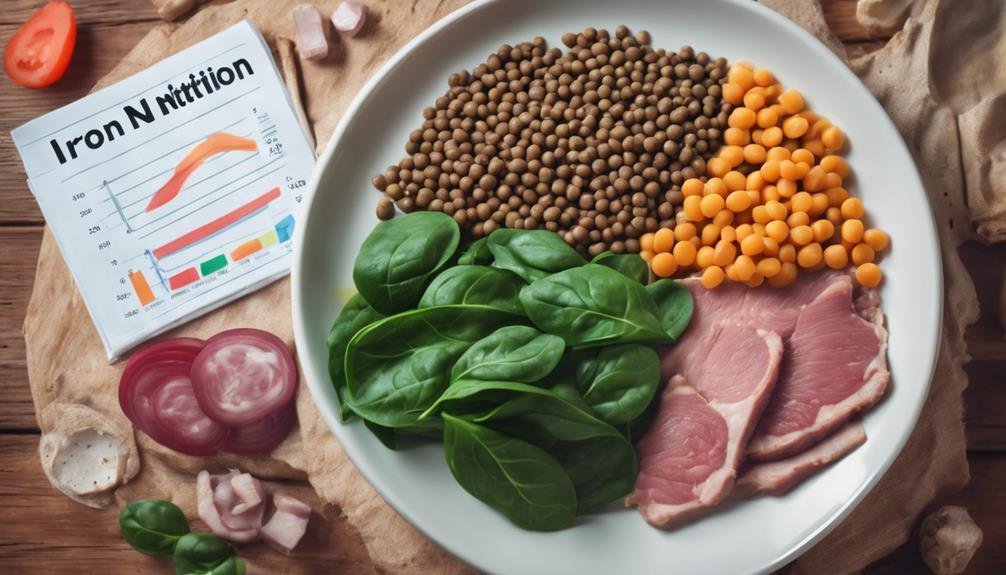"Cherishing Little Steps - A Haven for Baby and Family Journeys"
The Science Behind Toddler Nutrition: What New Studies Say
Have you ever wondered if the type of food your toddler eats could impact their cognitive development? Recent studies have shed light on the correlation between toddler nutrition and cognitive functions, revealing intriguing insights that may surprise you. Understanding the science behind toddler nutrition goes beyond just satisfying hunger; it plays a pivotal role in shaping your child's future health and well-being. Curious to learn more about the latest findings in this fascinating field?
Key Takeaways
- Recent studies emphasize the importance of balanced diets for toddlers' growth and development.
- New research highlights the role of probiotics in supporting toddlers' gut health and immunity.
- Emerging findings underscore the negative impacts of excessive sugar consumption on toddlers' well-being.
- Current research reaffirms the significance of iron-rich foods for cognitive development in toddlers.
- Recent studies stress the long-term health implications of early nutrition choices on toddlers' overall well-being.
Nutrient Requirements for Toddlers

When considering nutrient requirements for toddlers, it's crucial to focus on providing a balanced diet rich in essential vitamins and minerals. Toddlers require a variety of nutrients to support their rapid growth and development. Iron is particularly important as it helps in the formation of hemoglobin, which carries oxygen in the blood to all parts of the body. Foods rich in iron such as lean meats, beans, and fortified cereals should be included in their diet.
Calcium is another vital nutrient needed for the development of strong bones and teeth. Dairy products like milk, yogurt, and cheese are excellent sources of calcium that should be incorporated into their meals. Additionally, toddlers need adequate amounts of Vitamin C to support their immune system and promote iron absorption. Fruits like oranges, strawberries, and kiwi are great choices to meet this requirement.
Impact of Early Nutrition Choices
Making informed and nutritious choices during early stages of toddlerhood significantly influences their long-term health and development. The impact of early nutrition choices on toddlers can't be overstated. Research indicates that providing a well-balanced diet rich in essential nutrients such as vitamins, minerals, proteins, and healthy fats is crucial for their growth and cognitive development. For example, adequate intake of iron supports brain development, while calcium and vitamin D are vital for building strong bones and teeth.
Moreover, early exposure to a variety of fruits, vegetables, and whole grains helps establish healthy eating habits that can last a lifetime. Studies have shown that toddlers who consume a diverse range of foods are more likely to meet their nutritional needs and have a lower risk of developing chronic diseases later in life. Therefore, as a parent or caregiver, your choices play a pivotal role in shaping your child's health trajectory. By prioritizing nutrition and offering a wide array of nutrient-dense foods, you're laying a solid foundation for their overall well-being.
Role of Probiotics in Child Health

Probiotics play a crucial role in supporting your child's health by promoting a balanced gut microbiome, which is essential for overall well-being and immunity. These beneficial bacteria can positively influence various aspects of your child's health, from supporting digestion to boosting their immune system. Incorporating probiotics into your child's diet can help maintain a healthy balance of gut bacteria, which is vital for their growth and development.
| Probiotic Strain | Health Benefits | Food Sources |
|---|---|---|
| Lactobacillus | Supports digestion | Yogurt, kefir |
| Bifidobacterium | Boosts immune system | Fermented foods |
| Saccharomyces | Reduces inflammation | Tempeh, miso |
| Streptococcus | Supports oral health | Cheese, buttermilk |
It's important to note that while probiotics can be beneficial for your child's health, it's always best to consult with a healthcare provider before introducing any new supplements or making significant changes to their diet. Remember, a well-rounded diet rich in fruits, vegetables, whole grains, and probiotic-rich foods can contribute to your child's overall health and well-being.
Effects of Sugar on Development
To ensure optimal development in your child, it's important to consider the impact of sugar consumption on their overall growth and well-being. Excessive sugar intake in toddlers has been linked to various negative effects on development. High sugar consumption can lead to energy spikes followed by crashes, affecting mood stability and behavior. Additionally, sugary foods often displace essential nutrients in the diet, potentially hindering proper growth and cognitive function.
Research suggests that a diet high in sugar may contribute to obesity in toddlers, which can have long-term implications on their health. Furthermore, excessive sugar intake has been associated with an increased risk of dental issues such as cavities in young children. By monitoring and moderating your child's sugar intake, you can help promote their overall well-being and development.
It is crucial to prioritize nutrient-dense foods over sugary treats to support your child's growth and ensure they receive the necessary vitamins and minerals for optimal development.
Importance of Iron-Rich Foods

Ensuring an adequate intake of iron-rich foods is essential for supporting your toddler's growth and cognitive development. Iron plays a crucial role in the body as it helps carry oxygen to all cells, including those in the brain. Studies have shown that iron deficiency in toddlers can lead to cognitive delays, behavioral problems, and decreased immune function. Therefore, it's important to include iron-rich foods such as lean meats, poultry, fish, beans, lentils, fortified cereals, and leafy green vegetables in your toddler's diet.
Toddlers aged 1-3 years need about 7 mg of iron per day to meet their developmental needs. Incorporating a variety of iron-rich foods into their meals can help ensure they meet this requirement. Pairing these foods with sources of vitamin C, like fruits and vegetables, can also enhance iron absorption. Additionally, limiting the intake of foods that can inhibit iron absorption, such as calcium-rich dairy products, during iron-rich meals is beneficial.
Strategies for Picky Eaters
Including a variety of colorful and flavorful foods in your toddler's meals can help encourage a more adventurous palate and combat picky eating habits. Introducing new foods gradually, alongside familiar favorites, can increase acceptance. Encourage your child to explore different textures and tastes by involving them in meal preparation or grocery shopping. Research suggests that repeated exposure to certain foods can lead to greater acceptance over time. It's important to remain patient and persistent, as it may take multiple attempts before a child starts enjoying a new food.
Another strategy is to make mealtimes enjoyable and stress-free. Create a positive atmosphere by sitting down together as a family without distractions like TV or electronic devices. Offer choices within healthy options to give your child a sense of control. Remember, toddlers have small stomachs, so frequent snacks may be necessary to meet their nutritional needs. Consulting with a healthcare provider or a nutritionist can provide tailored advice for your child's specific needs.
Addressing Common Nutritional Deficiencies

Encouraging a diverse range of colorful and nutrient-rich foods in your toddler's diet is crucial for addressing common nutritional deficiencies that may arise during this developmental stage. Here are five key nutrients to focus on to ensure your toddler's diet is well-rounded and meets their growing needs:
- Iron: Incorporate iron-rich foods like lean meats, poultry, beans, and fortified cereals to support healthy brain development.
- Calcium: Include dairy products, fortified plant-based milk, and leafy green vegetables to promote strong bones and teeth.
- Omega-3 Fatty Acids: Offer fatty fish like salmon, chia seeds, and walnuts for optimal brain and eye development.
- Vitamin D: Ensure exposure to sunlight and include fortified foods like milk and cereals for proper calcium absorption and bone health.
- Fiber: Offer whole grains, fruits, and vegetables to support digestion and prevent constipation.
Frequently Asked Questions
Can Toddlers Get Enough Nutrients From Vegetarian or Vegan Diets?
You can provide toddlers with all necessary nutrients through well-planned vegetarian or vegan diets. Ensure they get adequate protein, iron, calcium, vitamin D, and B12. Consult a pediatrician or nutritionist for guidance and support.
How Does Food Texture Affect Toddler Nutrition and Development?
To support optimal toddler nutrition and development, consider food textures. Varied textures help with oral motor skills and sensory experiences, promoting healthy eating habits. Include soft, crunchy, and chewy foods for a well-rounded diet.
What Role Does Hydration Play in Toddler Nutrition?
Staying hydrated is vital for your toddler's nutrition. Water helps with digestion, nutrient absorption, and overall health. Encourage sips throughout the day, offer water-rich fruits like watermelon, and limit sugary drinks for a balanced diet.
Are Organic Foods Really Better for Toddlers?
Organic foods can offer toddlers higher nutrient content and fewer pesticides. Choosing organic can reduce exposure to harmful chemicals linked to health issues. Remember to wash all produce thoroughly, whether organic or conventional, for safety.
How Do Food Allergies Impact Toddler Nutrition and Growth?
Food allergies can significantly impact toddler nutrition and growth. They may limit certain food choices, leading to potential nutrient deficiencies. Remember, it's essential to work closely with a healthcare provider to ensure your child's dietary needs are met.
Conclusion
In conclusion, ensuring that your toddler receives a balanced diet rich in essential nutrients is vital for their growth and development.
Have you considered the long-term impact of your child's nutrition choices? Remember, the foods they consume now can shape their health outcomes in the future.
By prioritizing nutrient-dense foods, iron-rich sources, and calcium-containing options, you're setting your toddler up for a healthier life ahead.
Make informed choices for your child's well-being today.


